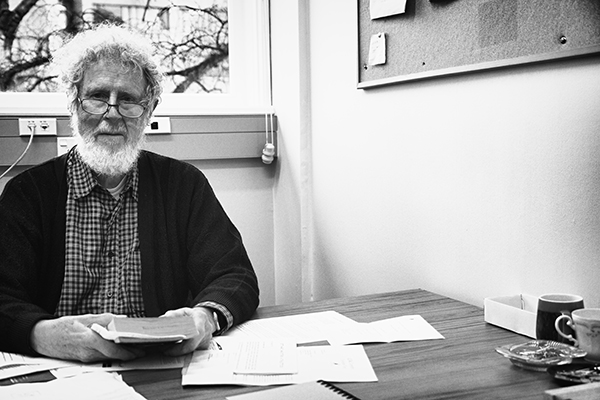Jimmy Boy
In a corner of Prof. Flynn’s office is a corner shelf dedicated to books penned by the man himself, as well as an armful of those by other philosophers who credit contributions made by Prof. Flynn. That collection is set to increase with the publication of four more books penned by Prof. Flynn this year alone. His latest offering, Are We Getting Smarter? Rising IQ in the 21st Century, seeks to make sense of our rising IQs and what this means for our intelligence, our minds, and society in general.
The last century has seen huge gains in IQ test scores. Prof. Flynn documented the trend, named the Flynn effect, of substantial and continuous increases in intelligence test scores since the onset of testing. According to Flynn, “Everyone is interested in intelligence. Everyone wants to make their child more intelligent. Everyone wants to know why we are more intelligent today than we were 50 years ago.”
Prof. Flynn believes that we are actually no brighter than the humans of 100 years ago. Rather, it is the comparatively science-driven contemporary world that has changed the way we assess reality. “We have scientific spectacles, and [our ancestors] had utilitarian ones. They were fixated on concrete reality. We live in a world of symbols that are removed from reality, of separate realities and visual images; all sorts of things that didn’t exist then.”
Flynn’s latest book identifies how our minds have evolved over the last century to deal with a world well removed from that of people in 1900. Our ancestors categorized the world and were unwilling to take the hypothetical seriously, while today’s population classifies the world and uses logic in hypothetical situations. “We have to remember that in 1900 the average person saw only representational photographs and numbers. If you were to pose them a question like, ‘What do dogs and rabbits have in common?’ they will say, ‘You use dogs to hunt rabbits.’ That is, they would give a utilitarian answer. You would say they are both mammals. That is, you classify the world as a prerequisite to understanding it.”
Prof. Flynn’s retention of statistics and narratives from his past research explains how he can publish one book after another so rapidly. In our interview he shed some light on the complexities of the research chronicled in Are We Getting Smarter?, and how the data informs concepts of gender, race, and human development. Of particular interest was that university samples of the IQ of men and women revealed women to be two or three points below men. For example, if a girl and a boy of 17 both had an IQ of 100, the girl would receive better marks. As a result, more women with an IQ of 100 will qualify for university, meaning the male university community will be more intellectually elite. But Prof. Flynn regards this as advantageous to women: “Boys are more rebellious – they miss class, they hand in homework late… Young women are acquiring better skills at school not because they are brighter, but as a matter of temperament. They take discipline better.”
The book also touches on Prof. Flynn’s research into IQ data, which has revealed that the growth of inward-looking teenage subculture has meant a reduction in vocabulary gains for school children. While today’s teenagers are able to understand the active vocabulary of their parents, their 1950s counterparts were able to both understand and mimic it. Prof. Flynn reveals that in 1950 the word teenager didn’t exist, and teenagers and children were passed off as small adults. “Most teenagers wanted to become adults as quickly as possible to get the prerogatives of adulthood, namely an independent income, a car, privacy and sex. Today, teenagers have all these without being wage earners … teenagehood has become a sort of blessed state, often to be extended by kids up until their 30s.” However, Prof. Flynn assures us that this is not a permanent state, and that IQ tests allow us to diagnose social tendencies that might otherwise be overlooked. Interestingly, he remarked that only a fifth of the vocabulary lapse is made up at University, and it is not until students enter the workforce and are forced to deal with adult clientele that a full vocabulary is developed.
Prof. Flynn observes that the book is of interest not just to psychologists, but to the general public. However, it is a different beast to his recent trilogy, which reflects Flynn’s personal dissatisfaction with modern education. The trilogy, comprised of The Torchlight List, Fate & Philosophy: A Journey Through Life’s Great Questions, and How To Improve Your Mind: Twenty Keys To Unlock the Modern World, reflects Prof. Flynn’s mission to change how we think about the modern world, our place in it, and our moral choices. “I would like to think that those three books collectively mean young people, even young people not at university, can give themselves a proper education rather than just know how to do conveyancing, or know how to interpret Spanish drama, or know the narrow subject they learned at university.”
Prof. Flynn’s palpable and inspirational passion for his research and books has won international recognition from scholars. After reading Prof. Flynn’s book How To Improve Your Mind, Harvard College Professor Steven Harvard said that had it been available when Harvard reformed its curriculum it would have done a great deal of good. It appears that Prof. Flynn’s contribution to intelligence trends will live on for many years to come, not only in the “Flynn Effect” but also in the many books he has penned or contributed to.








